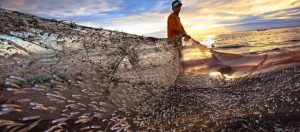 Fisheries Reform: Time to Draw in the Net Wed , Jul 10, 2013 – By Achim Steiner, UN Under-Secretary General and UN Environment Programme (UNEP) Executive Director
Fisheries Reform: Time to Draw in the Net Wed , Jul 10, 2013 – By Achim Steiner, UN Under-Secretary General and UN Environment Programme (UNEP) Executive Director
The agreement promises to reverse decades of excessive overfishing by European fleets
Achieving healthy fish stocks globally was a key challenge flowing from Rio+20 and will be a central litmus test for realizing an inclusive Green economy.
So it is good news that Europe recently reached an historic agreement to reform its Common Fisheries Policy (CFP) that promises to reverse decades of excessive overfishing by European fleets.
FURTHER RESOURCES
UNEP Green Economy Initiative
The agreement covers the rebuilding of fish stocks and the setting of legally binding targets to end overfishing alongside reducing catches of non-target fish as well as wasteful discarding.
It could mark a watershed in the European Union’s resolve towards sustainable fisheries.
But European policy makers are not there yet. In the coming months, members of the European Parliament and ministers must agree on a renewed fisheries subsidies regime – the proposed “European Maritime and Fisheries Fund” (EMFF) – which will support the objectives of the CFP between 2014 to 2020.
Aligning the fund’s more than 6 billion Euros is going to be key if sustainable fisheries are to be realized.
Current subsidies – globally estimated to range between $15-34 billion annually – are one of the primary causes of overfishing.
In the past, European subsidies have contributed to the dramatic expansion of Europe’s fishing fleets and a significant driver behind the depletion of fisheries at home and abroad.
Reforms of the past decade have ended some of the most harmful practices.
But gaps remain and loopholes could potentially still permit financial support for expanding already oversized fleets beyond sustainable levels.
The need to reform fisheries subsidies is not unique to Europe.
The international community, including the EU, recognised the global need to eliminate harmful fisheries subsidies as early as 2002, and reaffirmed their commitment to do so at the Rio+20 Summit last year.
A decade of World Trade Organization negotiations have also produced real progress towards a binding agreement to prohibit subsidies that lead to overcapacity and overfishing – that is, until the Doha Round crashed in 2009, leaving fisheries subsidies reform a victim of global trade politics.
A growing number of countries, including important fishing nations such as Indonesia and Ecuador, have shown serious interest in reforming their fisheries subsidies policies.
Regional trade talks, such as the ongoing Trans-Pacific Partnership negotiations, continue to provide opportunities for cooperative solutions. But leadership from global players, such as the EU, remains a sine qua non of effective international action.
As with green economy policies generally, serious and significant reforms to EU fisheries subsidies will ultimately reward the industry and consumers with a stable, profitable and sustainable fishing sector.
If European leadership can help achieve this globally, the rewards would be magnified across the world.
Fisheries provide significant economic benefits and jobs, employing directly and indirectly about 12 per cent of the world’s population.
They are a critical component of global food security, serving as the main source of protein for nearly a billion people globally. According to the World Bank and the Food and Agricultural Organization of the UN, an end to overfishing could recoup an estimated US$ 50 billion per year, currently being lost due to today’s unsustainable practices.
The EMFF legislation provides a unique opportunity for the EU to showcase its commitment to greening an important sector of its economy.
Re-focusing subsidies that were previously used to expand fleets, modernize vessels and provide cheap fuel, into programmes that support sustainable growth is the key to success and can enhance the rebuilding of fish stocks by for example improving fisheries management and strengthening monitoring, control and enforcement.
The reform of the CFP is evidence that Europe is embracing a pathway towards a green economy.
In the coming months, a strong decision on the design and implementation of the EMFF in regards to fisheries subsidies will signal not only the EU’s leadership on reforming fisheries but also its wider commitment to a sustainable century.
– See more at: http://www.unep.org/newscentre/Default.aspx?DocumentID=2723&ArticleID=9568&l=en#sthash.bCKLnFsa.dpuf





